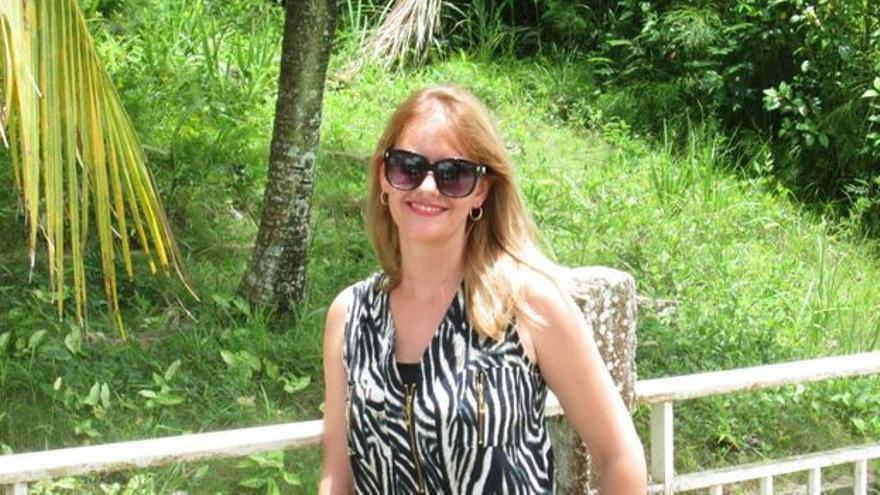
![]() 14ymedio, Havana, 10 September 2018 — Professor Dalila Rodríguez González of Villa Clara was prevented from leaving the country this Sunday, she told 14ymedio by phone. The young woman is the third member of her family to be restricted from traveling abroad.
14ymedio, Havana, 10 September 2018 — Professor Dalila Rodríguez González of Villa Clara was prevented from leaving the country this Sunday, she told 14ymedio by phone. The young woman is the third member of her family to be restricted from traveling abroad.
Rodríguez, a philologist who was expelled from Central University of Las Villas and forbidden to teach because of her closeness to groups that promote religious liberty, said that she had been invited to Argentina by the Center for the Opening and Development of Latin America (CADAL).
“An official from the Ministry of the Interior at the Santa Clara airport asked me to wait to be called again when I tried to pass through migration,” said Rodriguez.
A few minutes later, she was taken to a room where an official informed her that she was under a travel ban. As has happened with other activists and human rights defenders on the island, when trying to investigate the causes of their travel ban, immigration officials explained to Rodriguez that they could not provide more information.
“It was almost an interrogation,” said Rodriguez, a member of the Patmos Institute, an evangelical group that promotes religious freedom and respect for human rights on the island. “They did not notify me in advance, looking to do double damage,” Rodríguez adds.
In a statement issued by Cadal on Sunday, the organization referred to Article 13, paragraph 2 of the Universal Declaration of Human Rights, which recognizes that, “Everyone has the right to leave any country, including their own, and toreturn to their own country.”
On this trip the academic was going to participate, between September 12 and 14, at the Sixth Latin America Think Tanks Summit, the theme of which is Think Tanks: a bridge over stormy waters and turbulent times.
At the event, which will take place in Montevideo, Rodríguez had planned to be a member of the panels New Faces and Ideas: Diversity of Think Tanks and Innovation and Think Tanks and the Media.
As part of her agenda in the Uruguayan capital, the academic was going to hold meetings with José Gabriel González Merlano, a specialist in religious freedom at the Catholic University of Uruguay and, in Buenos Aires, with authorities of the Argentine Council for Religious Freedom.
Dalila Rodríguez González has a degree in literature and a master’s degree in Spanish linguistic-editorial studies. Since 2006 she has been a professor of Spanish and Scientific Communication in the Department of Foreign Languages of the Faculty of Humanities of the Martha Abreu Central University of Las Villas until she was expelled last year.
The argument put forward by the university to justify her expulsion was that the professor had not been able to “correct a group of attitudes that differ in the social and ethical aspects from the correct educational teaching required by her status as a teacher, and that can affect training of the students.”
In April of this year she participated in activities with Cadal in Argentina, Chile, Peru and Uruguay, as well as attending the alternative conference to the VIII Summit of the Americas, presenting The Right to Democracy in Cuba. She offered a talk at the Institute of Liberty and Development in Santiago, Chile on Cuba Before the Third Universal Periodic Review before the United Nations Human Rights Council, along with the Chilean deputy Jaime Bellolio.
On Sunday, Cadal denounced in a statement that “Cuba is the only country in Latin America and one of the few in the world that arbitrarily prevents people from leaving the country.”
In the statement, the organization asked the governments of Latin America and the European Union to express their concern to the Cuban government “for the violation of this fundamental right” and to “call for an end to this arbitrary practice, especially in the case of a country that will serve twelve years as a member of the UN Human Rights Council.”
What happened on Sunday is part of the tactic used by the government against activists on the island. The arrests, the surveillance, the confiscation of personal belongings, the raid of their homes and the imposition of judicial charges and to all this is added, more and more often, a travel ban under any pretext.
_________________________
The 14ymedio team is committed to serious journalism that reflects the reality of deep Cuba. Thank you for joining us on this long road. We invite you to continue supporting us, but this time by becoming a member of 14ymedio. Together we can continue to transform journalism in Cuba.
